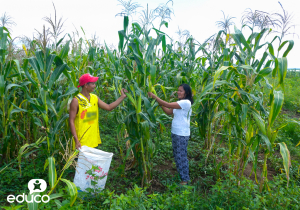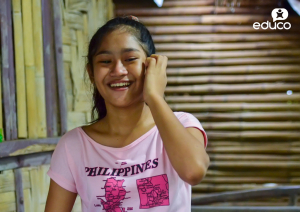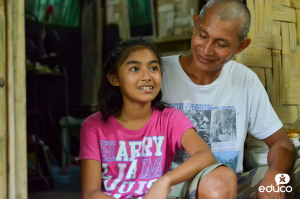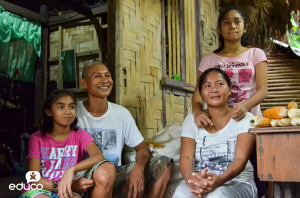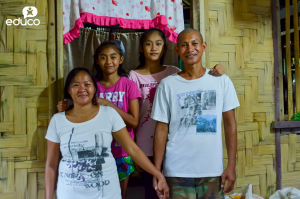Farmers all around the Philippines oftentimes face a dilemma more challenging than climate change, and that is how to shift from their traditional methods of farming to embracing new technologies that could help improve their agricultural life. Such is the case of husband and wife Domingo and Eden of Libon, Albay.
Domingo and Eden Tipanero are typical farmers who were into traditional farming practices. After about 10 years of being farmers, they shifted to organic agriculture in 2013 and are now experiencing the gains of going organic.
“Our first concern was the health of our family and those who buy our produce,” the couple shares why they shifted.
Eden is a health volunteer in their village in Libon, Albay. Domingo was not born in a family of farmers but Eden is. “I learned the ropes from her family. We were contemplating on taking our chances in the metro back when we got married,” Domingo reminisces. “We were given a piece of land as wedding gift but I still worked in the metro as a construction worker. But with the birth of our first child, we made the decision and took our chances with what we have at that time. I did not know how to farm then but my wife’s family has been very supportive,” he further shares.
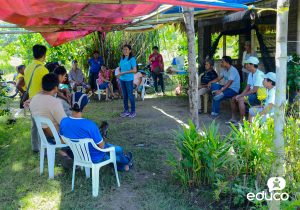 In 2013, Educo Philippines started implementing the Organic Agriculture-based Social Enterprise (OABSE) Project. This covered 20 villages across five municipalities in Albay, Camarines Sur and Sorsogon. The OABSE farmers were trained to use seeds that are open pollenated varieties to minimize their dependence to commercially produced varieties. They were also trained on technologies to manage soil fertility better and improve their resilience to unpredictable weather and stronger typhoons. They were also advised to practice the cropping calendar to manage possible oversupply of crops of the same type at the same time.
In 2013, Educo Philippines started implementing the Organic Agriculture-based Social Enterprise (OABSE) Project. This covered 20 villages across five municipalities in Albay, Camarines Sur and Sorsogon. The OABSE farmers were trained to use seeds that are open pollenated varieties to minimize their dependence to commercially produced varieties. They were also trained on technologies to manage soil fertility better and improve their resilience to unpredictable weather and stronger typhoons. They were also advised to practice the cropping calendar to manage possible oversupply of crops of the same type at the same time.
Today, these farmers were already organized into farmer’s associations and registered with the Department of Labor and Employment’s Bureau of Rural Workers enabling them to have legal personalities to conduct business.
The farmers were also linked with the Local Government Units (LGU) and the Department of Agriculture (DA)-Regional Office 5. These linkages have earned them opportunities to be consulted as community-based organizations during LGU planning. The association in Libon in Albay, where Domingo and Eden are members, were provided with a land cultivator worth about Php250,000 (~€4.800) from the national government. Other associations were also grantees of technical and financial assistance from DA.
“We were able to improve our income from farming up to 50% since we are now producing our own organic fertilizers like vermicast and fermented plant juice and fruit juice. We are now practicing seed banking so we do not buy commercial seeds anymore,” they also happily share.
The additional income was used to buy school uniform and other school supplies for their daughters Laica (12 years old, now Grade 8) and Shyra (10 years old, Grade 6).
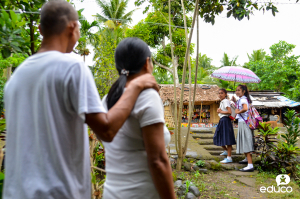 “We want our children to finish their education and become what they want be. We want them to have what we unfortunately did not experience. We only completed secondary school and we needed to work after,” the couple explains.
“We want our children to finish their education and become what they want be. We want them to have what we unfortunately did not experience. We only completed secondary school and we needed to work after,” the couple explains.
When asked what they dream of becoming after finishing college, Laica shares, “I want to become a flight stewardess since I want my parents to experience a better life. I really appreciate what they do for my sister and I.”
Domingo and Eden are now working hard to ensure that they have savings so that they would not need to loan money in case their children need anything more for their schooling. Domingo augments their income as a bakery help and in peddling bread in adjacent villages.
“I really, really want to study hard so that I will be able to help them when I grow up. Like my sister, I also want to be a flight stewardess so my parents need not travel through bus when they can fly,” says Shyra, the younger of the siblings. Both girls are doing well in school.
OABSE Project was a by-product of the Nutrition and Environment Projects implemented in late 2000. Since it was implemented it has already scaled up the kitchen gardens, which ensured availability of nutritious food on the table and become an income-generating opportunity for the families.
Educo believes that the environment does not have to be sacrificed when livelihood is resource-based.
“Development is not always about equipment and machinery advancement; in this case, we are just going back to basics and letting nature take care of itself. This is also called folk-tech,” Imelda Abalos, Educo-Philippines Country Director states.
# Story by Mariella, MEL Specialist | Contributor: Chyrel San Andres, Project Officer


